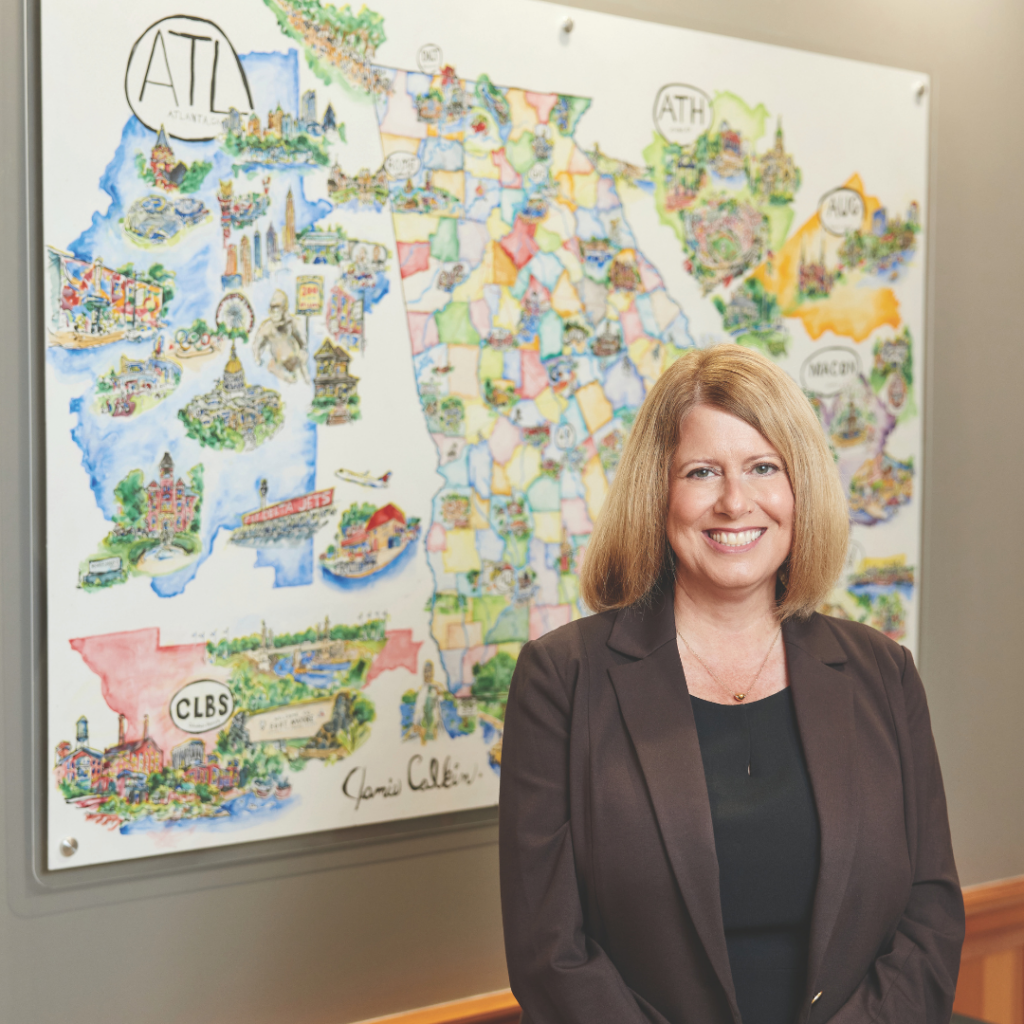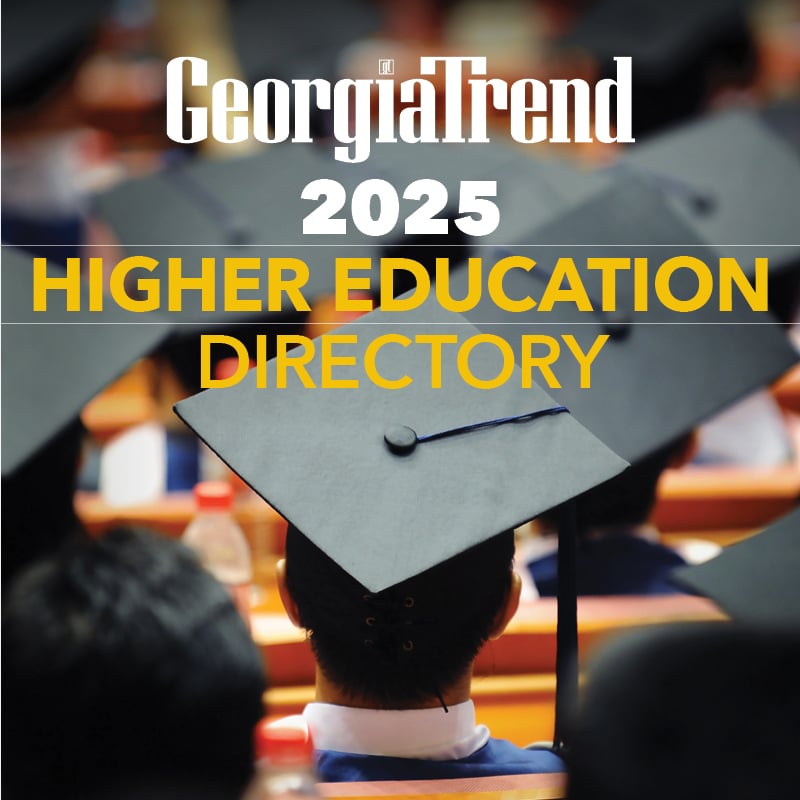Making the Grade
MBA programs statewide get high rankings, as they prepare students for the changing needs of business.
The MBA programs at Georgia’s public and private business schools are doing an impressive job of keeping up with the times. Companies are rethinking how they work and who they hire, as advanced technology drastically changes how businesses operate.

Head of the Class: Brian Mitchell, associate dean of full-time MBA programs and global strategy and initiatives, and Gareth James, the John H. Harland Dean at Emory’s Goizueta Business School. | Photo credit: Daemon Baizan
“Industries across the board are exploring applications for advanced technology such as robotics and AI, and this is driving a desire for employees with skill sets such as analytics, data and coding,” says Kristi Brigman, deputy commissioner of Global Commerce for the Georgia Department of Economic Development (GDEcD).
Managers and consultants with those skills are needed not only at companies in Georgia but worldwide. A 2023 survey by the Graduate Management Admission Council (GMAC) found that 43% of employers across industries cite technology, software and programming as increasingly important skills for MBA students, according to Andrew Walker, GMAC’s director of research analysis and communications. GMAC, founded in 1953, provides resources, events and services that annually help more than 12 million prospective MBA students connect to business schools worldwide to assess which one might offer the education that will best help them achieve their career goals.
“This doesn’t mean U.S. employers expect every business school graduate to be a software engineer,” says Walker. “But [it] indicates [an] opportunity for business schools to further cultivate knowledge at the intersection of business and technology.”

Cultivating Knowledge: Andrew Walker, Graduate Management Admission Council director of research analysis and communications. | Photo credit: contributed
Three elite MBA programs in Georgia are doing just that: Emory University’s Goizueta Business School, Georgia Tech’s Scheller College of Business and the University of Georgia’s Terry College of Business. The business schools are among the top 30 full-time MBA programs in Bloomberg Businessweek’s 2023-24 ranking of the best U.S. business schools. Goizueta is the highest ranked at 16, Scheller is next at 20 and Terry College of Business is 27.
UGA’s program is getting buzz for multiple reasons. In 2018-2019, Bloomberg Businessweek ranked the state’s flagship university at 62. The reason for the spike includes the recruitment of high-quality and diverse students, a loyal alumni base and a focus on professional development, according to Santanu Chatterjee, associate dean of Terry’s diversity, international and master’s programs. In addition to the impressive Bloomberg ranking, the Financial Times of London recently ranked UGA’s full-time MBA program as the best value for the money worldwide.
Bloomberg Businessweek bases its rankings on “data provided by participating schools as well as survey responses from students, alumni and employers,” according to its website. Five indexes are at the heart of its ranking – compensation, learning, networking, entrepreneurship and diversity.
Deans at each school say that rankings are important but emphasize that they create curriculum with a goal to prepare students to start a successful career path, not improve the school’s ranking among various publications or organizations. The deans view rankings as validating hard work by faculty and staff to prepare students to succeed in a business world that increasingly needs MBA graduates with technical skills.
“While we are future-facing in combining the power of AI, data science and technology, you have to do that with business foundations, strategic leaders and analytical thinkers. We haven’t forgotten that, even as we turn toward the future.” Brian Mitchell, associate dean of full-time MBA programs and global strategy and initiatives, Goizueta Business School at Emory University
Gareth James, the John H. Harland Dean at Emory’s Goizueta Business School, has made it a priority to ensure that MBA students are ready for technology-oriented workplaces. He has made it a point to say that fostering innovation for a data- and technology-driven world is a strategic theme, says Brian Mitchell, associate dean of full-time MBA programs and global strategy and initiatives. “This is going to be the future of Goizueta.”
Goizueta is emphasizing analytics through a specialized STEM-designed master’s program in business analytics (MSBA). “Things like artificial intelligence, blockchain and some of the underpinning technologies – and how to use all of that to make smart business decisions – [reside] in that world of analytics,” says Mitchell, describing the program’s offerings. “The MSBA allows all [Goizueta] programs, including all MBA programs, to [incorporate] that knowledge.” Mitchell says that, along with technology, Goizueta’s MBA programs include critical elements of leadership such as emotional intelligence. “While we are future-facing in combining the power of AI, data science and technology, you have to do that with business foundations, strategic leaders and analytical thinkers. We haven’t forgotten that, even as we turn toward the future,” he says.

Fostering Innovation: Students at Emory University’s Goizueta Business School. | Photo credit: Emory University’s Goizueta Business School
Broad Appeal
Goizueta offers multiple MBA formats: two full-time programs (a one-year and two-year option); an evening program with traditional, accelerated and express options for working professionals; and a flexible schedule executive program.
At a time when domestic enrollment in elite, full-time MBA programs has fallen, Goizueta’s overall enrollment is up. Mitchell attributes the increase to a dramatic rise in international applications. He is especially proud of the global diversity of applicants from such places as Vietnam and Singapore in Asia and small countries in Africa like Ghana, the Congo and Rwanda.
Another enrollment driver, says Mitchell, is Emory’s location. “More than 750 of the Fortune 1000 companies have a presence [in Atlanta],” says Mitchell, emphasizing that Goizueta’s experiential program gets students outside the classroom.
The University System of Georgia (USG) aims to provide a variety of business administration master’s programs that deliver technical skills Georgia businesses need.
More than 4,000 students have graduated from USG MBA programs in the most recent three-year period for which employment data is available (2019-2021). USG’s two flagships, Georgia Tech and UGA, produced the bulk of those graduates (1,696), with approximately three-fourths of them (1,243) employed in Georgia a year after graduating, according to USG data.

Generating Results: Peter Severa, assistant dean of student engagement for MBA programs, and Dave Deiters, associate dean of MBA programs and the Jones MBA Career Center, at Georgia Tech’s Scheller College of Business. | Photo credit: Daemon Baizan
At Georgia Tech’s Scheller College of Business, “there’s a little bit of a myth that [because] this is Georgia Tech … this is only an MBA for engineers,” says Dave Deiters, associate dean of MBA programs and the Jones MBA Career Center.
“Half our students come from a STEM background, and others are from a wide variety of backgrounds, including business, humanities and social sciences,” says Peter Severa, assistant dean of student engagement for MBA programs. Even so, he points out, the MBA program attracts engineering students and helps them build their business and leadership skills. “We have a program called TI:GER [Technology Innovation: Generating Economic Results] in which students have an opportunity to bridge business and engineering on cross-collaborative teams.” Collaborative is a really important word, Deiters says, adding that Scheller graduates know how to collaborate as a team. “That is to me one of the important things we offer our students.”
Using Technology
Scheller embraces technology, including AI, and has offered courses and lectures for a few years in areas such as blockchain, fintech and cryptocurrency, according to both the deans.
When the public accessibility of ChatGPT and similar types of AI expanded quickly, Severa recalls, there was a little bit of a gut reaction in which some faculty and staff were concerned about how students would use it. Scheller quickly moved past that. Now, “it has become another learning tool that we need to teach students how to use responsibly,” says Severa. “Companies are going to be looking for people who can leverage that tool. Those people are going to win out against people who have stayed away from it.”
Scheller, which offers full-time, evening and executive MBA programs, has also seen a decline in domestic applications. However, enrollment overall is up due to a spike in international applications. “The growth of other programs, be it online or whatever, has cannibalized nationwide the full-time MBA [enrollment],” says Deiters, adding that Scheller’s part-time evening MBA is enjoying steadily rising applications.

Concierge-Style Instruction: Santanu Chatterjee, associate dean for diversity, international and master’s programs at the University of Georgia’s Terry College of Business. | Photo credit: Daemon Baizan
The enrollment picture is a bit different in Athens. “We are probably one of the few schools that has bucked the national trend the last few years,” says Chatterjee. “We have seen an increase in our domestic applications and a good increase in our international applications.” What sets Terry apart, he believes, is a combination of small class size with a personalized concierge-style instruction, a 70,000-plus global alumni network and a focus on applied learning with business partners. The Financial Times ranking also helps explain Terry’s growing application numbers, he says.
Terry’s approach to technology has evolved from offering just standalone courses on topics such as analytics and coding to integrating technology instruction across the curriculum with topics such as AI, blockchain, cybersecurity and financial technology. In the core program, for example, there is a menu of analytics courses.
Beyond that, Terry’s MBA curriculum emphasizes hands-on programming, coding, data analysis and in-depth discussion of how automation will affect the future of work. “In addition, we offer an option to our fulltime MBA students to stack on a second master’s degree in business analytics focused on data science programming, statistical analysis, machine learning, artificial intelligence and prediction analysis, among other topics,” says Chatterjee.
Terry offers a full-time on-campus MBA program as well as executive, professional and online programs in Atlanta. The staff seeks to leverage Georgia’s robust economy by creating a balance between in-class instruction and applied learning. They have done that by hiring senior industry executives to serve as part-time faculty and creating a workplace experience in which students in different specializations work on eight- to 15-week projects-based classes with various companies and nonprofits.
Other MBA programs across USG are making modifications as Georgia businesses shift toward data analytics and technology. These programs feature USG’s WebMBA consortium, a collaboration across multiple institutions with a cutting-edge curriculum and online courses ranging from business intelligence to entrepreneurship.
Georgia College & State University in Baldwin County, for example, incorporates predictive analytics and emerging technologies with a focus on solving business challenges in its core MBA courses. In February, as an indication of the impact of AI on business and academia, GCSU’s J. Whitney Bunting College of Business and Technology opened an AI Lab that will serve as a regional innovation hub and is an element in GCSU’s seven-year strategic plan, Imagine 2030.
“One of the goals of the plan is to distinguish GCSU as a leader in technology and equip students with the skills and insights needed to excel in a competitive workforce,” says Dean Micheal T. Stratton.
Online Programs Recognized
GCSU is especially proud that in February U.S. News & World Report ranked its online MBA program No. 2 in online MBA programs in Georgia. Other Georgia schools recognized by U.S. News & World Report for their online MBA programs include the University of West Georgia in Carroll County, the top-ranked program in the state for the third consecutive year; Kennesaw State University in Cobb County and Clayton State University in Clayton County.
Kennesaw’s MBA program has also received recognition elsewhere, according to Robin Cheramie, the dean of the Michael J. Coles College of Business at Kennesaw State University. “In addition to our U.S. News ranking, our executive MBA program is ranked No. 1 in Georgia and No. 3 in the nation by CEO Magazine; the Princeton Review ranked the online MBA program 36th in the nation, and Billboard Magazine recognized Kennesaw State for having one of the top music and entertainment business programs in the world,” he said in an email.
Another program getting notice is the Executive MBA at Georgia State University’s Robinson College of Business. The Financial Times rated the program No. 3 in the U.S. for alumni satisfaction and No. 7 worldwide. The newspaper also ranked the GSU program No. 21 among U.S.-based programs and No. 11 among public university programs. Another publication, CEO Magazine, also recognized Robinson’s Executive MBA – listing it as a top 10 program in the U.S. (No. 9) and ranking it No. 28 worldwide.
“What continues to set Georgia apart from our peers is the way our state agencies, including the University System of Georgia, maintain a collaborative relationship with the business community,” says the GDEcD’s Brigman.“This mutually-beneficial relationship results not only in addressing the workforce needs of companies, but also ensuring Georgia graduates have the skills to find jobs – and the opportunity to stay in Georgia after graduating.”
University System of Georgia Chancellor Sonny Perdue strongly seconds Brigman’s assessment. “As a data-driven organization using dashboards, the university system understands the need for graduates well-versed in fields including data analytics and technology is only going to grow. We delight in doing our part in what I call the virtuous cycle of economic development by providing, educating and graduating the talent flow that provides the best opportunity to be successful,” he said in an email.
Based on the rankings of MBA programs in and beyond the university system, the talent flow coming from schools across the state is well prepared to meet the innovative challenge of Georgia’s most technology-focused workplaces.
Reinhardt Rocks Online-Only MBA

New Curriculum Format: Professor Tony Daniel, MBA program coordinator, Reinhardt University’s McCamish School of Business. | Photo: contributed
Professor Tony Daniel happily agreed to become the coordinator of the Reinhardt University MBA program for the 2021-2022 academic year, but with a condition: to change the program from in-class to online and from an entrepreneurial focus to an applied format.
Daniel, along with Joe Mullins, dean of the McCamish School of Business, took the idea to university President Mark A. Roberts, who gave it his approval. Reinhardt, a private university affiliated with the United Methodist Church that offers 12 online degrees, began the new MBA format in August 2022. Daniel says the revamped program at the Cherokee County school offers 10 one-year courses and embraces emerging technologies and their impact on business and organizational development.
He says enrollment has jumped from around a dozen to 37. No longer limited by drive time to classes, students log in from as far away as Florida and Texas and even Canada, Italy and Spain. Daniel attributes several factors to the revamped program’s success. One is the new curriculum format. Previously, the curriculum narrowly focused on developing startup business plans.
“The [application format], quantitative decision-making, getting facts and data, turning facts and data into information, and then making solid decisions … can be used in any sector,” says Daniel. “It also provides professors tremendous flexibility to offer material that is current in a rapidly changing environment.”
A second reason for Reinhardt’s online success is the flexibility it offers employed adults in balancing work-life responsibilities. “My entire collegiate career, I worked all day and went to school at night,” says Daniel. He’s not sure he could do that now. Reinhardt’s online MBA, Daniel says, allows students – a mix of recent undergraduates, lower- and middle-level managers and even a few vice presidents – to work at their own pace anywhere, even while traveling.

Success Story: Dominique Xiong, graduate of Reinhardt University’s McCamish School of Business. | Photo contributed
Success stories from the new approach abound, including that of Dominique Xiong. While an undergrad in another department, she sought Daniel’s advice about changing paths. At his urging, after graduating she enrolled in Reinhardt’s online MBA program.
Today, she is a talent acquisition specialist for Waffle House, Inc. where she uses her MBA experience to shape how she approaches critical business decisions. “My time in the Reinhardt MBA program could not have been a more crucial cornerstone for me to grasp the nuances of the legal, strategic and cultural aspects behind what ‘business decisions’ really are,” Xiong said in an email.






